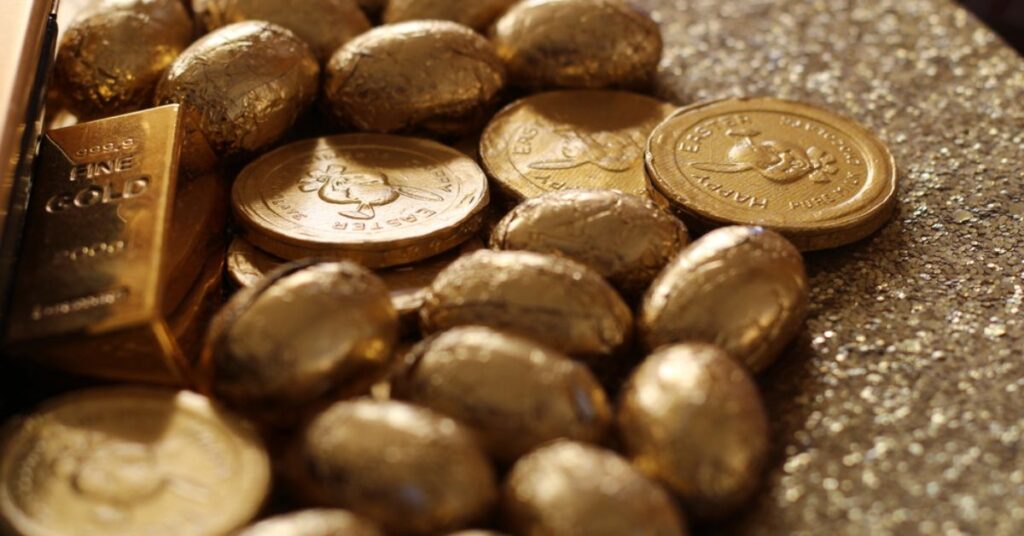Many wonder about the potential of working with valuable metals. The answer lies in the diverse opportunities and stability offered by this industry. From mining to trading to craftsmanship, careers in precious metals present numerous avenues for success.
With the demand for precious metals remaining high, there are ample job prospects available. Whether one chooses to work as a miner, trader, jeweler, or investment banker, the industry offers stability and potential for growth. Despite some sectors facing stagnant growth, the overall outlook for careers in precious metals remains promising, making it a viable and attractive career path for many individuals.
What Are Precious Metals?
Precious metals are rare metallic elements with high economic value due to various factors such as scarcity, industrial uses, historical significance, and desirability for investment purposes.

Some of the most well-known precious metals include gold, silver, platinum, and palladium. These metals are highly sought after and have been used for centuries for various purposes ranging from currency and jewelry to industrial applications and investment assets.
Skills Required for This Career
| Skills | Description |
| Technical Knowledge | Understanding properties, uses, and market trends of precious metals. |
| Analytical Skills | Ability to analyze data, market trends, and financial information related to precious metals. |
| Problem-Solving | Capacity to find creative solutions to complex challenges in the precious metals industry. |
| Communication | Effective communication with clients, colleagues, and stakeholders in various contexts. |
| Attention to Detail | Precision in working with precious metals to ensure quality and accuracy. |
| Financial Acumen | Understanding financial principles, risk management, and investment strategies. |
| Adaptability | Ability to adapt to changes in market conditions, regulations, and technology. |
| Safety Awareness | Prioritizing safety protocols and procedures when working with hazardous materials and equipment. |
Precious Metals Job Opportunities
In the realm of precious metals, various job opportunities abound, each offering a unique pathway to success. Mining engineers play a pivotal role, tasked with extracting valuable metals from deposits nestled deep within the earth’s crust.

On the trading front, precious metals traders navigate the dynamic markets, buying and selling gold, silver, platinum, and more on behalf of clients or companies. Refinery operators are indispensable, wielding their expertise to refine raw ore into the gleaming treasures coveted worldwide.
Meanwhile, assayers meticulously analyze ore samples, determining their purity and market value with precision. For the creatively inclined, jewelry designers craft stunning pieces, leveraging gold, silver, and other metals to fashion bespoke adornments.
Metallurgists, armed with technical prowess, manipulate metals for diverse applications, ensuring their optimal utility. Additionally, precious metals analysts provide invaluable insights, dissecting market trends and prices to guide investors in their financial endeavors.
Lastly, investment bankers offer strategic counsel, aiding clients in navigating the intricacies of investing in precious metals and related financial instruments. These roles collectively form the backbone of the precious metals industry, offering diverse opportunities for individuals to thrive and make meaningful contributions.
How Many Jobs Are Available In Precious Metals?
- The number of jobs available in the precious metals industry fluctuates based on economic factors and market demand.
- Various sectors within the industry offer employment opportunities, including mining, trading, refining, jewelry making, and financial analysis.
- Mining operations provide roles for miners, engineers, geologists, and safety specialists.
- Metal trading involves positions such as brokers, analysts, and traders.
- Refineries employ workers as operators, technicians, and quality control specialists.
- The jewelry sector offers jobs for designers, craftsmen, gemologists, and sales professionals.
- Financial institutions hire professionals specializing in precious metals investment, including bankers, advisors, and asset managers.
- While the exact number of jobs may vary, the diverse nature of the industry ensures opportunities across different sectors and skill levels.
The 5 Best-Paying Jobs in Precious Metals

Precious Metals Analyst
Responsible for analyzing and assessing gold, silver, platinum, and palladium prices, providing valuable insights to investors. Salaries can range from $70,000 to $150,000 per year, depending on experience and expertise.
Precious Metals Trader
Involved in buying and selling precious metals on behalf of clients or employers, utilizing market trends and trading strategies. Salaries vary widely, with experienced traders earning between $50,000 to $200,000 annually, including bonuses and incentives.
Precious Metals Investment Banker
Offers financial advisory services to clients interested in investing in precious metals, guiding market trends and risk management strategies. Top earners in this field can make upwards of $200,000 per year, including bonuses and stock options.
Jewelry Designer/Maker: Crafts custom designs with gold, silver, platinum, and palladium, catering to individual preferences and needs. Salaries range from $50,000 to $200,000 per year, depending on skill level and clientele.
Metallurgist/Metal Technician
Utilizes technical expertise to analyze and manipulate precious metals, ensuring quality and efficiency in extraction and processing. Salaries typically range from $50,000 to $200,000 per year, with opportunities for advancement and specialization.
5 Entry-Level Jobs in Precious Metals
Precious Metal Sales Associate
An entry-level position involving customer service, sales support, and basic knowledge of precious metals. Responsibilities include assisting customers with purchases, answering inquiries, and maintaining inventory. Salaries start at around $30,000 to $40,000 per year.
Jewelry Production Assistant
Entry-level role assisting in the manufacturing and assembly of jewelry pieces using precious metals. Duties may include soldering, polishing, and quality control checks. The average starting salary ranges from $25,000 to $35,000 annually.
Precious Metal Refinery Technician
Entry-level position working in a refinery setting, involved in the processing and purification of precious metals. Tasks may include melting, casting, and inspecting metal bars. Starting salaries typically range from $30,000 to $40,000 per year.
Precious Metal Laboratory Technician
Entry-level role in a laboratory environment, assisting with the testing and analysis of precious metals for purity and quality control purposes. Responsibilities may include sample preparation, conducting tests, and recording data. Salaries start at around $35,000 to $45,000 annually.
Precious Metal Logistics Coordinator
Entry-level position focused on coordinating the transportation and shipment of precious metals between suppliers, refineries, and customers. Responsibilities may include arranging logistics, tracking shipments, and managing documentation. Starting salaries range from $30,000 to $40,000 per year.
Education and Certification Requirements for a Career in Precious Metals

To embark on a career in precious metals, formal education, and certification can significantly enhance your prospects. Here’s what you need:
High School Diploma or Equivalent
While not always mandatory, a high school diploma or GED is typically the minimum educational requirement for most entry-level positions in the precious metals industry.
Associate’s Degree or Vocational Training
Pursuing an associate’s degree in fields like metallurgy, jewelry design, or metalworking can provide valuable knowledge and skills. Alternatively, vocational training programs focused on precious metal fabrication, refining, or gemology offer specialized education.
Apprenticeships or On-the-Job Training
Many roles in the precious metals sector, such as jewelry making or metalworking, require hands-on experience gained through apprenticeships or on-the-job training programs. These opportunities provide practical skills under the guidance of experienced professionals.
Certifications
Obtaining certifications relevant to your chosen career path can demonstrate proficiency and enhance job prospects. For example, the Gemological Institute of America (GIA) offers certifications in gemology, jewelry design, and appraisal, while the American Society for Nondestructive Testing (ASNT) provides certifications for nondestructive testing techniques used in metal analysis.
Continuing Education
Staying updated with advancements in precious metal technologies and industry standards is essential. Consider pursuing continuing education courses, workshops, or seminars to expand your knowledge and skills throughout your career.
Specialized Training Programs
Some roles, such as precious metal assaying or refining, may require specialized training programs offered by industry organizations or technical schools. These programs provide in-depth instruction on specific aspects of precious metal processing and analysis.
What Do People Working With Precious Metals Do?
People working with precious metals engage in a diverse range of activities across various sectors. Here are some common roles and tasks associated with working in the precious metals industry:
Metalworkers
Metalworkers, including jewelers, goldsmiths, and engravers, specialize in crafting and manipulating precious metals to create jewelry, decorative items, and other artifacts. They use tools such as hammers, chisels, and soldering equipment to shape, engrave, and assemble metal components.
Miners and Refiners
Miners are involved in the extraction of precious metals from ore deposits through mining operations. Refiners then process raw materials to extract pure metals, such as gold, silver, platinum, and palladium, using techniques like smelting, refining, and purification.
Precious Metal Brokers
Brokers facilitate the buying and selling of precious metals on behalf of clients, including individuals, institutions, and businesses. They leverage their knowledge of market trends, pricing dynamics, and regulatory requirements to execute transactions and manage investment portfolios.
Appraisers and Valuers
Appraisers assess the value of precious metal items, including jewelry, bullion, and collectibles, based on factors such as metal purity, craftsmanship, and market demand. They provide accurate valuation reports for insurance, taxation, estate planning, and resale purposes.
Assayers
Assayers specialize in analyzing the composition and purity of precious metals using chemical and metallurgical testing methods. They perform assays to determine the precious metal content of samples and ensure compliance with quality standards and regulatory requirements.
Jewelry Designers
Jewelry designers conceptualize and create unique jewelry designs using precious metals, gemstones, and other materials. They combine artistic vision with technical expertise to produce aesthetically pleasing and commercially viable jewelry pieces for retail or custom clients.
Antique Restorers
Antique restorers specialize in the conservation and repair of antique metal objects, including precious metal artifacts, sculptures, and decorative items. They employ techniques such as cleaning, polishing, soldering, and re-plating to restore the original appearance and integrity of valuable antiques.
Metal Analysts
Metal analysts conduct research and analysis on precious metal markets, supply chains, and pricing trends to provide insights and recommendations to investors, traders, and industry stakeholders. They monitor market indicators, economic data, and geopolitical events to forecast market movements and inform investment decisions.
Recent Job Searches
| Job Title | Description |
| Jewelry Designer | Design and develop unique jewelry pieces using precious metals and gemstones; collaborate with clients, source materials, and oversee production process. |
| Precious Metal Broker | Facilitate transactions between buyers and sellers of precious metals such as gold, silver, platinum, and palladium; require strong communication skills, market knowledge, and the ability to build and maintain client relationships. |
| Metalworker | Work hands-on with precious metals to create jewelry, decorative items, and custom designs; utilize specialized tools and techniques to shape, solder, and polish metal components. |
| Mining Technician | Support mining operations and ore processing activities related to precious metal extraction; require knowledge of mining equipment, safety procedures, and environmental regulations, as well as skills in data analysis and reporting. |
| Precious Metal Analyst | Conduct research and analysis on market trends, supply chains, and pricing dynamics for precious metals; gather and interpret data, prepare reports, and provide insights to inform investment decisions. |
| Antique Restorer | Assess and repair antique pieces, including precious metal artifacts, sculptures, and decorative items; clean and polish metal surfaces, and apply conservation techniques to preserve historical integrity. |
| Assayer | Analyze the composition and purity of precious metal samples using chemical and metallurgical testing methods; require knowledge of laboratory procedures, equipment operation, and quality control standards to ensure accurate assay results. |
| Metal Fabricator | Work with precious metals to fabricate custom components, prototypes, and architectural features; interpret blueprints, cut and shape metal materials, and weld or solder metal joints. |
Get Free Strategy
Define Your Goals
Clearly articulate what you want to achieve with your strategy. Whether it’s increasing sales, expanding market reach, or improving brand awareness, knowing your objectives is crucial.
Know Your Audience
Understand your target audience’s needs, preferences, and pain points. Conduct market research to gather insights into their behavior and demographics.
Identify Key Channels
Determine the most effective channels to reach your audience based on their preferences and behavior. This could include social media, email marketing, content marketing, or search engine optimization (SEO).
Create Compelling Content
Develop engaging and valuable content that resonates with your audience. This could include blog posts, videos, infographics, or podcasts that address their needs and interests
Optimize for SEO
Ensure your website and content are optimized for search engines to improve visibility and attract organic traffic. Use relevant keywords, meta tags, and quality backlinks to enhance your online presence.
Utilize Social Media
Leverage social media platforms to connect with your audience, build relationships, and promote your brand. Share valuable content, engage with followers, and participate in relevant conversations.
Implement Email Marketing
Set up email campaigns to nurture leads, retain customers, and drive conversions. Personalize your messages, segment your audience, and provide valuable offers to encourage engagement.
Measure and Analyze Results
Track the performance of your strategy using key performance indicators (KPIs) such as website traffic, engagement metrics, conversion rates, and ROI. Use this data to make informed decisions and optimize your approach over time.
Iterate and Improve
Continuously refine your strategy based on insights gained from analytics and feedback from your audience. Experiment with new tactics, test different approaches and stay updated on industry trends to stay ahead of the competition.
Main Forex Info
Currency Pairs: Forex involves trading currency pairs, where one currency is exchanged for another.
Market Hours: Forex operates 24 hours a day, five days a week, allowing for continuous trading across different time zones.
High Liquidity: The forex market is highly liquid, meaning trades can be executed quickly and with minimal price impact.
Volatility: Prices in the forex market can be volatile, influenced by factors like economic data releases, geopolitical events, and central bank actions.
Market Participants: Participants in the forex market include central banks, commercial banks, hedge funds, corporations, retail traders, and institutional investors.
Trading Platforms: Forex trading is conducted through online platforms provided by brokers, offering tools for analysis and order execution.
Leverage: Forex trading often involves the use of leverage, allowing traders to control larger positions with a smaller amount of capital.
Risk Management: Successful traders employ risk management strategies, such as setting stop-loss orders and proper position sizing, to protect their capital.
Analysis Methods: Traders use technical analysis, based on price charts and indicators, and fundamental analysis, based on economic data and news events, to make trading decisions.
Regulation: The forex market is regulated in different countries to ensure fair and transparent trading practices, and traders should choose regulated brokers for security.
Precious Metals Job Opportunities
| Job Title | Description |
| Precious Metals Broker | Act as an intermediary between buyers and sellers of precious metals, facilitating transactions and providing market insights. |
| Jeweler | Design, create, repair, and appraise jewelry made from precious metals like gold, silver, platinum, and palladium. |
| Goldsmith | Specialize in crafting and repairing items made of gold, such as jewelry, decorative objects, and ceremonial pieces. |
| Engraver | Use specialized tools to etch designs, patterns, or text onto precious metal surfaces, including jewelry, trophies, and plaques. |
| Precious Metals Miner | Work in extraction operations to locate, extract, and refine precious metals from ore deposits. |
| Precious Metals Refiner | Operate refining equipment to purify raw metals obtained from mining operations, ensuring quality and purity standards are met. |
| Antique Restorer | Restore and preserve antique jewelry and artifacts made from precious metals, using specialized techniques to maintain historical integrity. |
| Metal Assayer | Analyze the composition and purity of precious metals using chemical and spectroscopic methods, ensuring adherence to industry standards. |
| Precious Metals Trader | Buy and sell precious metals on financial markets, analyzing market trends and executing trades to maximize profitability. |
| Precious Metals Investment Advisor | Provide guidance and advice to individuals or institutions looking to invest in precious metals, helping them build diversified portfolios. |
Final thought
In conclusion, embarking on a career in precious metals presents a myriad of opportunities and challenges. While some roles offer lucrative salaries and creative fulfillment, others may require specialized skills and extensive training.
Despite potential fluctuations in market demand and technological advancements, the enduring allure of precious metals ensures a steady demand for skilled professionals across various sectors. Whether one chooses to pursue a career in jewelry design, mining, trading, or investment advisory, the key lies in passion, perseverance, and adaptability.
While the industry may evolve, the intrinsic value of precious metals and their role as timeless assets ensure that a career in this field remains a viable and rewarding path for those with a penchant for craftsmanship, innovation, and financial acumen.
Read As: Gold Price Fintechzoom: Real-Time Gold Price Updates on Fintechzoom
Frequently asked question
Is a career in precious metals financially rewarding?
Yes, many roles in the precious metals industry offer competitive salaries and opportunities for growth.
Do I need a college degree to work with precious metals?
While some roles may require a degree, many positions can be obtained through apprenticeships or trade schools.
Are there opportunities for career advancement in the precious metals industry?
Yes, depending on the chosen field, there are avenues for advancement through gaining experience and expanding skills.
Is the demand for precious metals careers stable?
Overall, the demand for skilled professionals in the precious metals industry remains relatively stable, though specific sectors may experience fluctuations.
What skills are essential for success in a career involving precious metals?
Skills such as craftsmanship, attention to detail, financial acumen, and adaptability are highly valued in the industry.
Are there risks associated with working in the precious metals field?
Like any industry, there are risks such as market fluctuations and technological advancements, but careful planning and staying informed can mitigate these risks.
Can I pursue a career in precious metals part-time or as a side hustle?
Yes, depending on the role, some opportunities may allow for part-time or freelance work, particularly in areas like jewelry design or trading.
What types of roles are available in the precious metals industry?
There is a diverse range of roles available, including jewelers, metal brokers, miners, traders, investors, and more.

James, with 5 years of business experience, brings expertise to our website. His profile reflects a commitment to excellence and innovation in his field.







